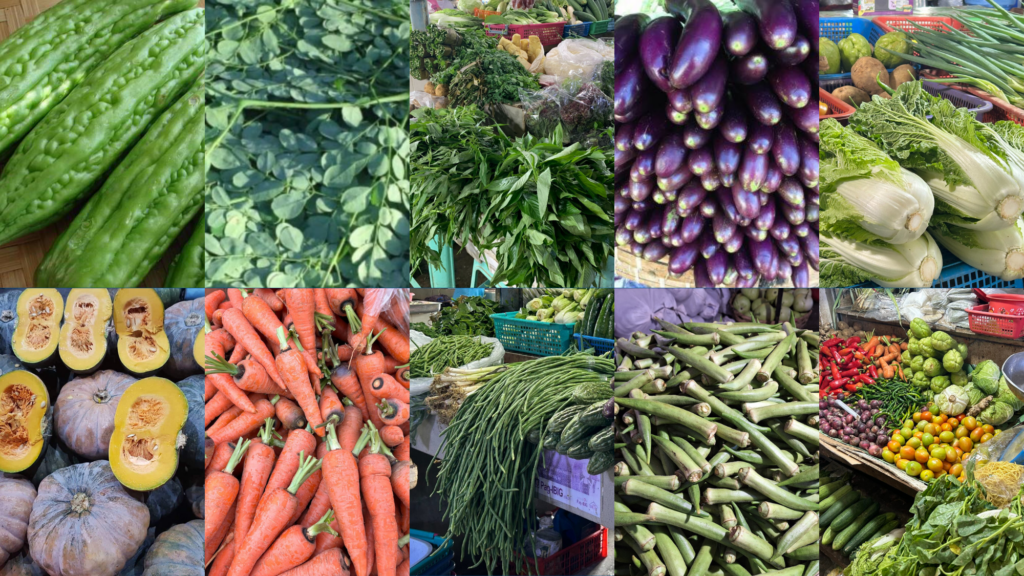Local vegetables are your best bet when it comes to maintaining a healthy diet without breaking the bank.
Packed with essential nutrients and available at affordable prices in your neighborhood markets, these veggies offer numerous health benefits.
Loverne Laza, a registered nutritionist-dietitian, breaks down the primary health benefits of commonly consumed vegetables like malunggay, kangkong, and pechay.
These locally grown produce not only support overall well-being but also provide a cost-effective way to enrich your diet with vitamins, minerals, and antioxidants.
From the nutrient-rich leaves of malunggay to the digestion-boosting fibers in kangkong, these vegetables prove that eating healthy doesn’t have to be expensive.
READ MORE:
How to be healthy and fit without breaking the bank and other stuff
Why eating and living healthy is good for you
How does family affect our relationship with food?
Here are 10 locally grown vegetables and their primary health benefits:

1. MALUNGGAY
Valued for its nutrient-rich leaves, packed with vitamins (A, C, E), minerals (calcium, potassium, iron), and essential amino acids.
It offers antioxidants, protecting cells from free radicals. With anti-inflammatory properties, malunggay may aid conditions linked to inflammation. Research indicates the potential for blood sugar regulation, benefiting individuals with diabetes.
Kangkong. CDN Digital photo | [FILE PHOTO | Nina Mae Oliverio]
2. KANGKONG
Abundant in vitamins A, C, and K, as well as minerals such as iron, calcium, and potassium, kangkong is packed with essential nutrients. It contains vitamin C and beta-carotene that offer antioxidant benefits that contribute to overall health.
With its high fiber content, kangkong aids in digestion and prevents constipation. It supports heart health through potassium and helps maintain strong bones with calcium and vitamin K. Being low in calories and fat, kangkong is ideal for those managing their weight. It enhances immune function with vitamin C and supports vision health with vitamin A.
3. PECHAY
Pechay and other fresh vegetables are displayed at a stall inside the Ramos Public Market. | [ CDN Digital file photo – Niña Mae Oliverio]
For bone health, pechay provides calcium and vitamin K, crucial for strong bones and for reducing osteoporosis risk.
Potassium in pechay supports heart health by regulating blood pressure. Its high dietary fiber promotes digestive health, prevents constipation, and supports gut function. With low calories and fat, pechay is beneficial for weight management.
Additionally, pechay supports skin health by promoting collagen production due to its vitamin C content.
Sitaw and other fresh vegetables are displayed at a stall at the Ramos Public Market. [ CDN Digital file photo | Nina Mae Oliverio]
4. SITAW
Sitaw is packed with essential vitamins like A, C, and K, and vital minerals such as folate, potassium, and iron, making it a valuable dietary addition. Its abundance of fiber supports digestive health, preventing constipation.
Potassium in sitaw aids in maintaining heart health by regulating blood pressure. Additionally, its calcium and vitamin K content helps strengthen bones and reduce osteoporosis risk.
Sitaw is low in calories, supporting weight management and a balanced diet. It also contains antioxidants like vitamin C and beta-carotene, which protect cells from damage.
READ MORE:
Eat your greens, grow them, too
74% of PH kids eat less veggies, fruits – study
Sayote or chayote and other vegetables are sold at the Carbon Public Market. | [CDN Digital file photo-Nina Mae Oliverio]
5. SAYOTE
Sayote is rich in essential vitamins like vitamin C, folate, and B6, as well as minerals such as potassium and manganese, providing crucial nutrients for overall health. Its fiber content supports digestive health, prevents constipation, and promotes gut health.
Potassium in sayote helps regulate blood pressure and supports heart function.
Low in calories and virtually fat-free, sayote is beneficial for weight management and maintaining a nutritious diet. Rich in antioxidants like vitamin C and flavonoids,
sayote protects cells from oxidative stress and inflammation. It also supplies calcium and
magnesium, essential for strong bones and reducing osteoporosis risk. With its high-
water content, sayote contributes to hydration, which essential for overall health and well-being.
Okra, also known as ladies finders. [CDN Digital file photo]
6. OKRA
Okra is abundant in vitamins C and K, alongside minerals such as magnesium, folate, and calcium, crucial for overall health. Its significant dietary fiber content promotes digestion, prevents constipation, and enhances gut health.
Potassium in okra aids in maintaining blood pressure and supporting heart function. Research suggests okra has the potential to stabilize blood sugar levels, benefiting those with diabetes. It contains antioxidants like vitamin C and polyphenols, which safeguard cells from free radical damage.
Okra supplies calcium and vitamin K, essential for bone strength and osteoporosis prevention. With its low calorie and high fiber content, okra supports satiety and aids in weight management. Additionally, vitamin C in okra promotes skin health by aiding collagen production.
Ampalaya.| CDN Digital file photo
7. AMPALAYA
Ampalaya is packed with essential vitamins such as C, A, and various B vitamins (folate, B1, B2, B3), alongside minerals like iron, calcium, potassium, and magnesium, providing diverse nutrients crucial for overall health.
It contains compounds like charantin and polypeptide-p, known to help regulate blood sugar levels, making it beneficial for individuals with diabetes. With antioxidant properties, ampalaya is rich in vitamin C and flavonoids, protecting cells from oxidative stress and inflammation.
Its high dietary fiber promotes healthy digestion, prevents constipation, and supports gut health. Ampalaya has potassium content helps regulate blood pressure and supports heart function.
Vitamin C in ampalaya boosts immunity by defending against infections. Low in calories yet high in fiber, ampalaya aids in satiety and supports weight management. Lastly, its vitamin C content enhances skin health by promoting collagen production.
Talong or eggplant are sold at a market in Cebu City. | CDN Digital file photo
8. TALONG or Eggplant
Packed with vitamins such as C, K, and various B vitamins including folate, along with essential minerals like potassium and manganese, talong provides vital nutrients for overall health. It contains antioxidants such as vitamin C and nasunin, which protect cells from oxidative damage and reduce inflammation.
Talong supports heart health by supplying potassium and fiber, which help regulate blood pressure and cholesterol levels. High in dietary fiber, talong promotes digestive health by aiding in healthy digestion, preventing constipation, and supporting gut health.
With its low calorie and fat content, talong is beneficial for weight management and maintaining a healthy diet. Research suggests talong may improve insulin sensitivity and regulate blood sugar levels, which is advantageous for individuals with diabetes.
While talong provides modest amounts of calcium and magnesium for maintaining strong bones, its vitamin C content supports collagen production, contributing to healthy skin.
Squash is sold at P20 to P30 per kilo in Barangay Tisa, Cebu City. | CDND FILE PHOTO / Immae Lachica
9. KALABASA
Kalabasa is packed with essential vitamins including A, C, E, and various B vitamins like folate, crucial for maintaining overall health. It also contains antioxidants such as vitamin C and beta-carotene, which play a key role in shielding cells from oxidative stress and bolstering immune function.
Furthermore, kalabasa serves as a valuable source of potassium and dietary fiber, aiding in the regulation of blood pressure, cholesterol levels, and promoting heart health. Its high fiber content supports healthy digestion, prevents constipation, and fosters gut health.
With low calories and fat, kalabasa is beneficial for weight management and maintaining a balanced diet. Additionally, it supplies calcium, magnesium, and vitamin K, essential for maintaining strong bones and reducing the risk of osteoporosis.
Carrots are sold at the Carbon Public Market. | CDN Digital file photo-Niña Mae Oliverio
10. CARROTS
Carrots are abundant in beta-carotene, a potent antioxidant converted into vitamin A by the body, crucial for vision, immune function, and skin health. This nutrient supports eye health, potentially lowering the risk of age-related macular degeneration (AMD) and cataracts.
Carrots also contain vitamin C and other antioxidants that protect cells from free radical damage, reducing the risk of chronic diseases. Their fiber and potassium content can improve heart health by regulating blood pressure and lowering cholesterol levels.
Carrots have dietary fiber promotes digestive health, prevents constipation, and supports regular bowel movements. Packed with vitamins and antioxidants, carrots bolster immune function, defending against infections. Their antioxidants and vitamin A enhance skin health by shielding against sun damage, promoting collagen production, and improving overall skin health.
With low calories and high fiber, carrots are a satisfying snack that aids in weight management by curbing cravings. Their fiber and antioxidants may also help manage blood sugar levels, beneficial for individuals with diabetes. Additionally, carrots provide essential nutrients like vitamin K and calcium, crucial for maintaining strong bones and reducing the risk of osteoporosis.


